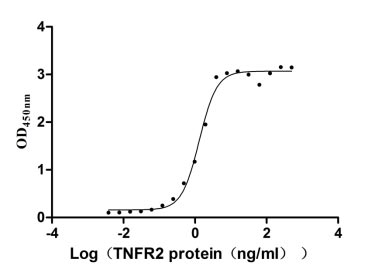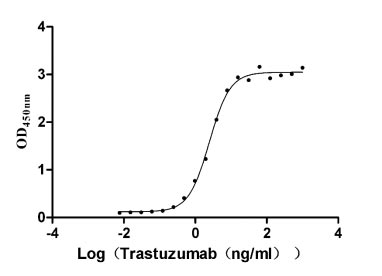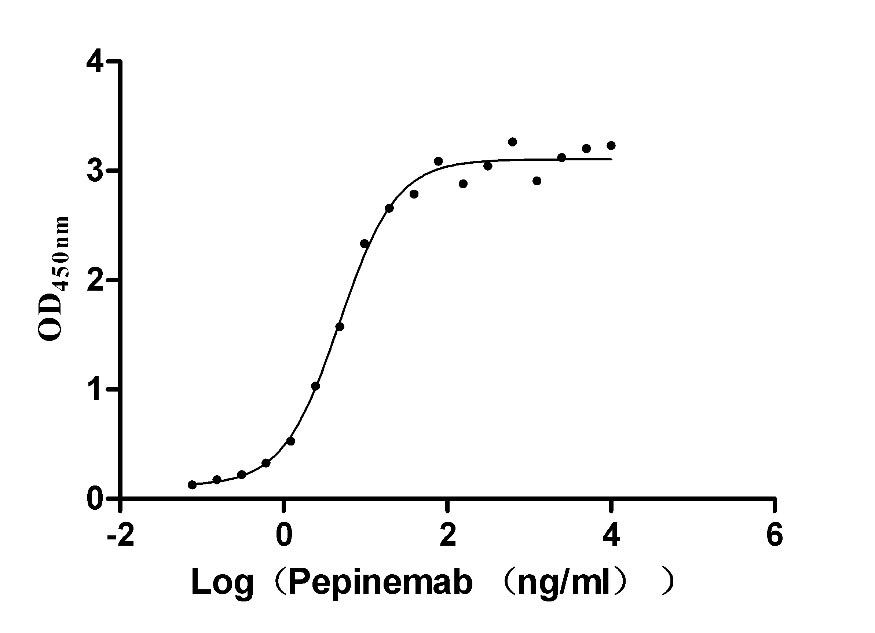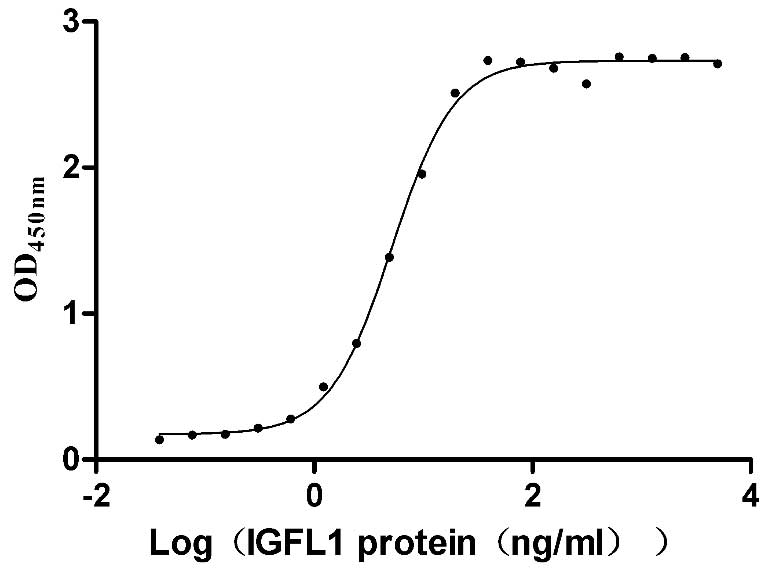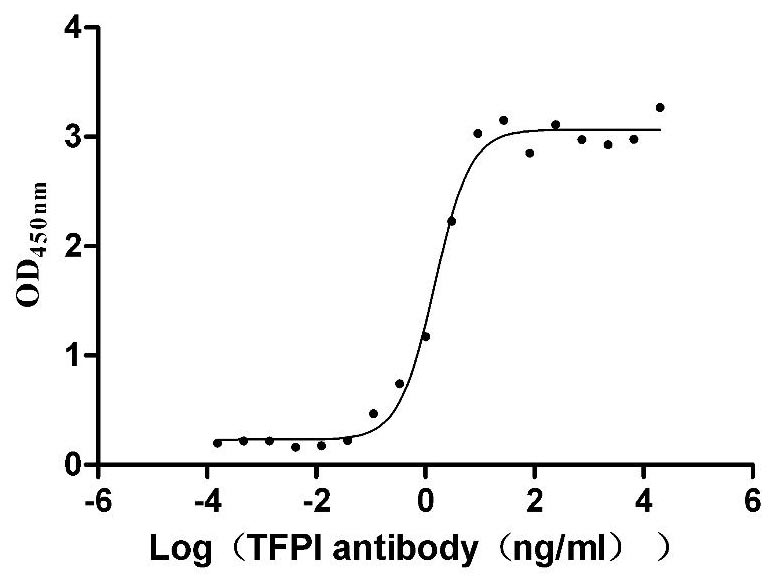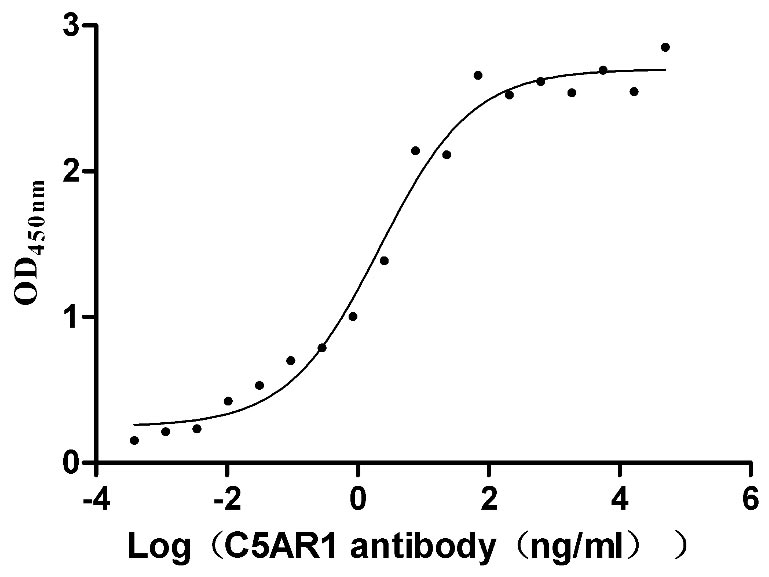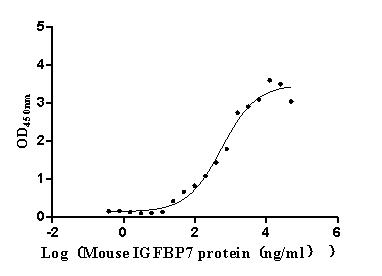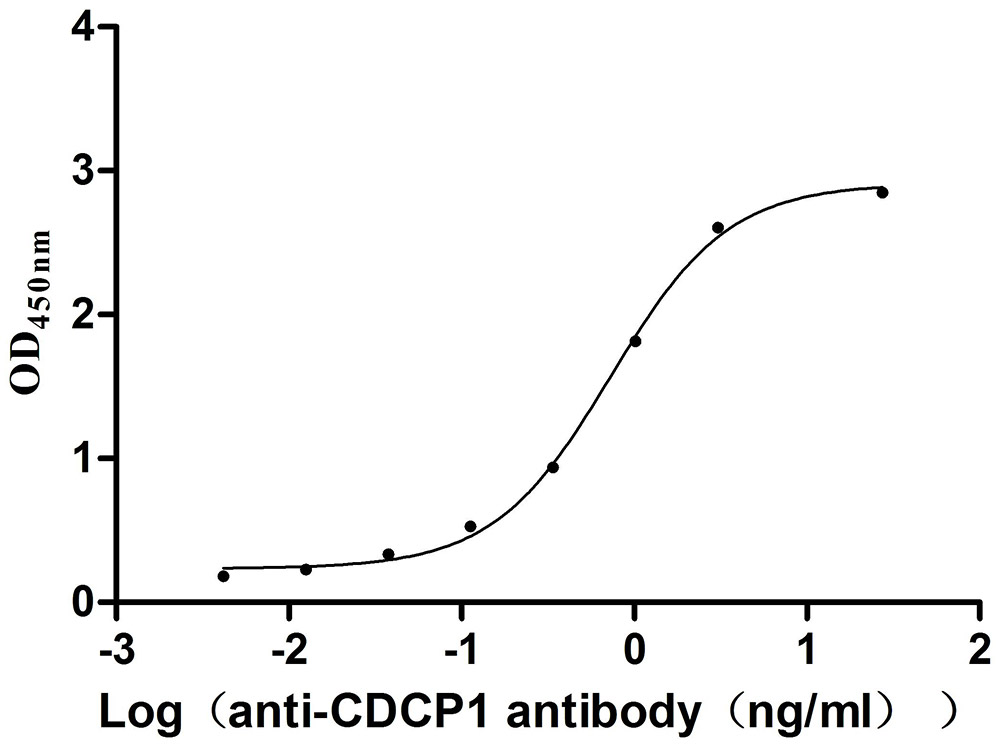Recombinant Human Ribosyldihydronicotinamide dehydrogenase [quinone] (NQO2)
-
货号:CSB-YP016040HU
-
规格:
-
来源:Yeast
-
其他:
-
货号:CSB-EP016040HU
-
规格:
-
来源:E.coli
-
其他:
-
货号:CSB-EP016040HU-B
-
规格:
-
来源:E.coli
-
共轭:Avi-tag Biotinylated
E. coli biotin ligase (BirA) is highly specific in covalently attaching biotin to the 15 amino acid AviTag peptide. This recombinant protein was biotinylated in vivo by AviTag-BirA technology, which method is BriA catalyzes amide linkage between the biotin and the specific lysine of the AviTag.
-
其他:
-
货号:CSB-BP016040HU
-
规格:
-
来源:Baculovirus
-
其他:
-
货号:CSB-MP016040HU
-
规格:
-
来源:Mammalian cell
-
其他:
产品详情
-
纯度:>85% (SDS-PAGE)
-
基因名:NQO2
-
Uniprot No.:
-
别名:DHQV; DIA6; EC 1.10.99.2; MGC94180; NAD(P)H dehydrogenase quinone 2; NAD(P)H menadione oxidoreductase 1 dioxin inducible 2; NAD(P)H menadione oxidoreductase 2 dioxin inducible ; NMOR2; NQO 2; NQO2; NQO2_HUMAN; NRH dehydrogenase [quinone] 2; NRH dehydrogenase; NRH:quinone oxidoreductase 2; OTTHUMP00000015948; OTTHUMP00000015949; OTTHUMP00000015953; Ox 2; Ox2; QR2; Quinone; Quinone reductase 2; Ribosyldihydronicotinamide dehydrogenase [quinone]; Ribosyldihydronicotinamide dehydrogenase
-
种属:Homo sapiens (Human)
-
蛋白长度:Full length protein
-
表达区域:1-231
-
氨基酸序列MAGKKVLIVY AHQEPKSFNG SLKNVAVDEL SRQGCTVTVS DLYAMNLEPR ATDKDITGTL SNPEVFNYGV ETHEAYKQRS LASDITDEQK KVREADLVIF QFPLYWFSVP AILKGWMDRV LCQGFAFDIP GFYDSGLLQG KLALLSVTTG GTAEMYTKTG VNGDSRYFLW PLQHGTLHFC GFKVLAPQIS FAPEIASEEE RKGMVAAWSQ RLQTIWKEEP IPCTAHWHFG Q
-
蛋白标签:Tag type will be determined during the manufacturing process.
The tag type will be determined during production process. If you have specified tag type, please tell us and we will develop the specified tag preferentially. -
产品提供形式:Lyophilized powder
Note: We will preferentially ship the format that we have in stock, however, if you have any special requirement for the format, please remark your requirement when placing the order, we will prepare according to your demand. -
复溶:We recommend that this vial be briefly centrifuged prior to opening to bring the contents to the bottom. Please reconstitute protein in deionized sterile water to a concentration of 0.1-1.0 mg/mL.We recommend to add 5-50% of glycerol (final concentration) and aliquot for long-term storage at -20℃/-80℃. Our default final concentration of glycerol is 50%. Customers could use it as reference.
-
储存条件:Store at -20°C/-80°C upon receipt, aliquoting is necessary for mutiple use. Avoid repeated freeze-thaw cycles.
-
保质期:The shelf life is related to many factors, storage state, buffer ingredients, storage temperature and the stability of the protein itself.
Generally, the shelf life of liquid form is 6 months at -20°C/-80°C. The shelf life of lyophilized form is 12 months at -20°C/-80°C. -
货期:Delivery time may differ from different purchasing way or location, please kindly consult your local distributors for specific delivery time.Note: All of our proteins are default shipped with normal blue ice packs, if you request to ship with dry ice, please communicate with us in advance and extra fees will be charged.
-
注意事项:Repeated freezing and thawing is not recommended. Store working aliquots at 4°C for up to one week.
-
Datasheet :Please contact us to get it.
相关产品
靶点详情
-
功能:The enzyme apparently serves as a quinone reductase in connection with conjugation reactions of hydroquinones involved in detoxification pathways as well as in biosynthetic processes such as the vitamin K-dependent gamma-carboxylation of glutamate residues in prothrombin synthesis.
-
基因功能参考文献:
- The ontogeny and population variability of human hepatic dihydronicotinamide riboside:quinone oxidoreductase (NQO2). PMID: 28346733
- In patients with Alzheimer's disease, QR2 is overexpressed in the insular cotex. PMID: 26609153
- NQO2-L47 is less stable towards proteolytic digestion and thermal denaturation than NQO2-F47. PMID: 24631540
- NQO1 609C>T and NQO2 -3423G>A polymorphisms do not seem to play any significant role in susceptibility or prognosis of EC in north Indian population. PMID: 22770696
- This first structure of a reduced quinone reductase shows that reduction of the FAD cofactor and binding of a specific inhibitor lead to global changes in NQO2 structure and is consistent with a functional role for NQO2 as a flavin redox switch. PMID: 23471972
- both NQO1 and NQO2 modulate the efficacy of AC therapy and that NQO2 is associated with tamoxifen toxicity. PMID: 21946896
- results indicate a role of NQO2 in the control of AKT/GSK-3beta/cyclin D1 and highlight the involvement of NQO2 in degradation of cyclin D1, as part of mechanism of chemoprevention by resveratrol PMID: 22266466
- Results suggest that NQO2, SOD2 and SOD3 may significantly modify prognosis of breast cancer patients. PMID: 21351093
- results suggest that the increase in hippocampal QR2 might be a cause of AD or might promote the progression of AD by causing an increase in the toxic quinone levels and consequent loss of cognitive function. PMID: 21803122
- Selective inhibition of NQO2 over NQO1 can be attributed to the bulky aminoalkylamino substituent at the 5-position, which blocks entrance of the indolequinones into the NQO1 active site. PMID: 21718050
- NQO2 is a target gene of the BACH1 transcription factor according to ChIP-seq analysis in HEK 293 cells. PMID: 21555518
- The NQO1 609C>T TT genotype and T allele were significantly associated with increased risk for gastric cancer (GC), whereas NQO2 -3423G>A polymorphism did not show any association with GC. PMID: 21294640
- The first European study of the SOD2, SOD3, NQO1, and NQO2 roles in pancreatic cancer etiology did not find significant associations. PMID: 20966810
- We observed a nominal significant association between the rs1143684 NQO2 polymorphism and the trajectory of delayed memory recall over time (p=0.029). No other associations were seen with the decline of other cognitive abilities. PMID: 18538895
- Our findings challenge the previous assumption that the NQo2 I-16 allele is stable only when paired with another I-16 allele PMID: 19495956
- polymorphisms associated with idiopathic Parkinson's disease PMID: 11688992
- A significant difference was found between alcoholic patients and controls in genotype frequency at an insertion/deletion site in the promoter region of the NQO2 gene (p = 0.0014). PMID: 12960511
- the level of NQO2 mRNA is low in AGR patients compared with the control group. Such a reduction in message suggests that the NQO2 gene may be involved in the development of clozapine-induced AGR. PMID: 14617031
- NQO2 gene may confer susceptibility to a certain form of schizophrenia. PMID: 14639047
- the NQO2 gene is differentially expressed by the polymorphic promoters in human cells transfected with NQO2 gene reporter constructs. Alterations in NQO2 activity might be an important factor in susceptibility to Parkinson's disease. PMID: 15451063
- We propose that induction of NQO2 may relate to the observed increased expression of p53 that, in turn, contributes to the observed suppression of cell growth in both melanoma cell lines. PMID: 15993843
- the nicotinamide adenine dinucleotide phosphate reduced-diaphorase interneurons in the human striatum. PMID: 16025450
- The results combined demonstrated that Nrf2 associates with JunD, binds to ARE at nucleotide -1433, and regulates human NQO2 gene expression and induction in response to antioxidants. PMID: 16545679
- an apparent association between an NQO2 exon 3 single-nucleotide polymorphism and lower enzymatic activity PMID: 17332305
- The crystal structure of melatonin and 2-iodomelatonin in complex with QR2 provide a detailed description of the enzyme active site; the design of inhibitors of the enzyme might be instrumental in discriminating the role of MT1, MT2 and QR2/MT3 PMID: 18254726
- Parkinson's disease patients were analyzed for NQO2 gene promoter polymorphisms. Three allelic variants were I-29, I-16 and D. The association of the D promoter with Parkinson's disease may be due to an increase in expression of the NQO2 gene. PMID: 18314446
- This first structural analysis of hQR2 should enable to better understand the biological role of melatonin on this enzyme . PMID: 18502195
- Quinone reductase 2 is a catechol quinone reductase. quinone reductase 2 could play important roles in the regulation of catecholamine oxidation processes that may be involved in the etiology of Parkinson disease. PMID: 18579530
- nmr studies of QR2 catalytic reaction were performed; results led to conclusion that melatonin is not cleaved to form N1-acetyl-N2-formyl-5-methoxykynurenine by a catalytically active QR2, indicating melatonin is neither a substrate nor a co-substrate PMID: 18826489
- NQO2 is a susceptibility gene for breast carcinogenesis. PMID: 19351655
显示更多
收起更多
-
亚细胞定位:Cytoplasm.
-
蛋白家族:NAD(P)H dehydrogenase (quinone) family
-
数据库链接:
HGNC: 7856
OMIM: 160998
KEGG: hsa:4835
STRING: 9606.ENSP00000337773
UniGene: Hs.533050
Most popular with customers
-
Recombinant Human Tumor necrosis factor receptor superfamily member 1B (TNFRSF1B), partial (Active)
Express system: Mammalian cell
Species: Homo sapiens (Human)
-
Recombinant Human Receptor tyrosine-protein kinase erbB-2 (ERBB2), partial (Active)
Express system: Mammalian cell
Species: Homo sapiens (Human)
-
Recombinant Human Semaphorin-4D (SEMA4D), partial (Active)
Express system: Mammalian cell
Species: Homo sapiens (Human)
-
Recombinant Human IGF-like family receptor 1 (IGFLR1), partial (Active)
Express system: Mammalian cell
Species: Homo sapiens (Human)
-
Recombinant Human Tissue factor pathway inhibitor (TFPI), partial (Active)
Express system: Mammalian cell
Species: Homo sapiens (Human)
-
Recombinant Human C5a anaphylatoxin chemotactic receptor 1 (C5AR1)-VLPs (Active)
Express system: Mammalian cell
Species: Homo sapiens (Human)
-
Recombinant Mouse Complement component C1q receptor (Cd93), partial (Active)
Express system: Mammalian cell
Species: Mus musculus (Mouse)
-
Recombinant Mouse CUB domain-containing protein 1 (Cdcp1), partial (Active)
Express system: Mammalian cell
Species: Mus musculus (Mouse)


